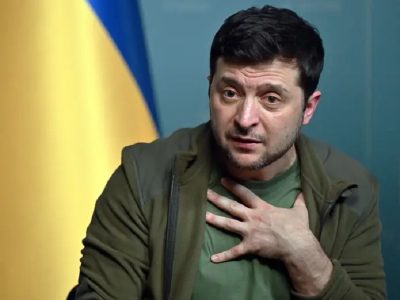Kiev Mayor Klitschko Speculated That Zelensky Might Agree to Territorial Compromises with Russia

Zelensky knows that he won’t reconquer his country’s lost territory no matter what he says for the purpose of keeping morale high, hence the need to informally explore a compromise for ending the conflict in the most politically “face-saving” way possible.
Kiev Mayor Vitaly Klitschko, who’s emerged as one of Zelensky’s top rivals over the past year, speculated in an interview with Italy’s Corriere Della Serra over the weekend that the Ukrainian leader might agree to territorial compromises with Russia. In his words,
“Will he…consider a territorial compromise with Putin?…Zelensky will probably have to resort to a referendum. I don’t think he can reach such painful and important agreements on his own without popular legitimacy.”
Klitschko also echoed Atlantic Council senior fellow Adrian Karatnycky’s demand from mid-December for Zelensky to create a “government of national unity” by suggesting that this could help disperse responsibility for unpopular decisions like mobilization and thus ease their implementation. His interview couldn’t have been more perfectly timed since it coincided with the signals that Ukraine sent over the past week about its newfound semi-seriousness in reviving peace talks with Russia as explained here.
To summarize for the reader’s convenience, the US’ political uncertainty, the Ukrainian Conflict’s military-strategic dynamics continuing to favor Russia, and the growing attractiveness of China as a mediator combined to influence Zelensky to send his top diplomat to Beijing. This will be Kuleba’s first trip there since 2022, which followed the first such trip to Kiev by the Vatican’s top diplomat during this same period, thus advancing the scenario of China and the EU (via the Vatican) jointly hosting peace talks.
This is precisely what Orban proposed in his peace mission report for the EU, but since he’s considered by the Eurocrats to be too toxic to associate with, they’d prefer relying on the Vatican as their backchannel for exploring Kiev’s interest in this possibility instead. Zelensky knows that China doesn’t support his maximalist objectives in this conflict, but it’s also not in favor of Russia’s either, so his decision to dispatch Kuleba to Beijing hints at an emerging interest to have it broker a compromise.
Accordingly, this could take the form of freezing the conflict along the Line of Contact (LOC), but without rescinding Kiev’s claims to Russian-controlled territory within Ukraine’s pre-2014 borders. He couldn’t realistically agree to this though without a referendum after the enormous costs that his country already paid. Klitschko sensed that something of the sort might soon be afoot even before Kuleba’s trip to Beijing was announced (his interview’s publication narrowly preceded it) and that’s why he shared what he did.
Nobody should have any false expectations about this happening anytime soon, let alone assuming that Russia would agree to it after President Putin said last month that no cessation of hostilities is possible without Ukraine first withdrawing from all the territory that Moscow now claims as its own. Even in the event that Kiev voluntarily complied, which is unlikely, then the Kremlin would likely also want other aspects of its national security interests to be ensured as well such as demilitarization and the like.
In any case, it could form a starting point for resuming dialogue with Russia, even if it’s only initially conducted via mediators like China and/or the EU (albeit via the Vatican instead of Orban). Zelensky knows that he won’t reconquer his country’s lost territory no matter what he says for the purpose of keeping morale high, hence the need to informally explore a compromise for ending the conflict in the most politically “face-saving” way possible, thus explaining Klitschko’s referendum speculation.
*
Click the share button below to email/forward this article to your friends and colleagues. Follow us on Instagram and Twitter and subscribe to our Telegram Channel. Feel free to repost and share widely Global Research articles.
Spread the Truth, Refer a Friend to Global Research
This article was originally published on the author’s Substack, Andrew Korybko’s Newsletter.
Andrew Korybko is an American Moscow-based political analyst specializing in the relationship between the US strategy in Afro-Eurasia, China’s One Belt One Road global vision of New Silk Road connectivity, and Hybrid Warfare. He is a regular contributor to Global Research.

